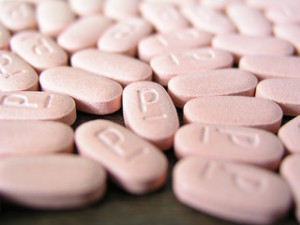Heartburn Drugs Boost Risk of Heart Attacks

Proton pump inhibitors boost heart attack risk.
Research is confirming that proton-pump inhibitor heartburn medications increase the risk of heart attacks.
When most people show up at the doctor’s office complaining of heartburn, the doctor will typically write up a script for a proton-pump inhibitor pharmaceutical drug. In addition, some proton-pump inhibitors are readily available over the counter. If you tell your pharmacist that you have heartburn, chances are he or she will hand you a proton-pump inhibitor.
Simply put, proton-pump inhibitors halt the production and release of acids produced by cells in the stomach’s lining. They are prescribed for a number of conditions, including ulcers, gastroesophageal reflux disease (AKA GERD in the U.S. and GORD in many other countries), eosinophilic esophagitis and Barrett’s esophagus, and other conditions that are worsened by the stomach’s acids.
Proton-pump inhibitors are the third best selling drug in the U.S. PPIs are prescribed to millions of people every year. Just in the U.S. more than 20 million folks are prescribed a. Over-the-counter purchases account for more than $14 billion in annual sales and more than 113 million prescriptions are filled around the world each year.
Common brands of proton-pump inhibitors include Prilosec, Losec and Omesec (omeprazole); Protonix/Generic (pantoprazole); Prevacid 24HR (lansoprazole); and Zegerid (omeprazole with sodium bicarbonate).
They come with a number of listed adverse side effects which include, abdominal pain, headaches, diarrhea, nausea and vomiting.
Now we can add a more dangerous adverse effect of taking one of the these drugs.
In this article
PPIs increase heart attack incidence
A new study from Stanford University School of Medicine analyzed data from 1.8 million patients together with 19 million encounters and 35 million diagnoses. It also utilized more than 11 million clinical notes – all from U.S. patients.
Of these patients, 93,149 were diagnosed with heartburn (GERD), and 46 percent of these patients took at least one of the PPIs.
In addition, the research team included a study of 1,503 people that started in 2004. This study analyzed patients for cardiovascular mortality. This is defined as death from heart attack, stroke, heart failure or an aneurysm.
The study found that of the GERD patients who took PPIs, the risk of heart attack increased an average of 16 percent among the PPIs, with the highest risk being a 34 percent increased risk for pantoprazole, and 26 percent increased risk of heart attack for omeprazole and 24 percent increased risk of a heart attack for lansoprazole.
When PPIs was prescribed for someone younger than age 55, the risk of heart attack went up to 26 percent across the board. Among those under 55 years old who took PPIs, the average age they had a heart attack was 41.7 years old, versus 54.5 years old in the general population.
In the second study – which gauged for deaths from cardiovascular disease – PPIs increased the incidence of death from heart disease by 222 percent – meaning they more than doubled ones risk of dying from heart disease.
Other studies showed increased heart disease risk for PPIs
Previous studies also showed this effect, but these were interpreted as increasing the risk of heart disease among those who were already at a high risk of heart attack. In a 2009 VA researchers followed 8,205 patients from the 127 Veterans Administration Medical Centers for 16 months. Of the patients, 5,244 people were prescribed PPIs.
This study found that those taking the PPIs had a 25 percent increased risk of acute coronary syndrome – which means not enough blood is getting to the heart. This can cause immediate death or hospitalization. Those that were prescribed PPIs plus clopidogrel had an even greater risk – 27 percent higher risk of death or hospitalization from acute coronary syndrome.
And a 2010 study from Copenhagen University followed 56,406 patients who had a previous heart attack for one year. They found those who had been prescribed PPIs after their heart attacks had a 29 percent increased risk of having another heart attack.
Yes, these studies showed that PPIs would raise the risk of heart attack among those with previous heart problems. But the new study from Stanford shows those without a history heart disease also will have an increased risk of heart attack if they take PPIs.
Particularly concerning is those in the lower risk categories – those under the age of 55 – also face a considerably increased risk.
Mechanism related to nitric oxide
Earlier studies lead to a suspicion that the affect may be related to combined drugs, such as clopidogrel mentioned above. This study illustrates that PPIs may produce greater risk if combined with other pharmaceuticals, but also increase risk acting alone.
The mechanism appears to be related to the PPI’s effect upon nitric acid regulation among the blood vessels. Dr. Nigam Shah, the lead researcher in the study and a professor of medicine at Stanford, echoed this:
“We looked at cardiovascular risk for different PPI drugs, and we found that the degree to which the use of any particular PPI was associated with a subsequent heart attack mirrors the degree to which the drug inhibits nitric oxide in the vasculature.”
REFERENCES:
Shah NH, LePendu P, Bauer-Mehren A, Ghebremariam YT, Iyer SV, Marcus J, Nead KT, Cooke JP, Leeper NJ. Proton Pump Inhibitor Usage and the Risk of Myocardial Infarction in the General Population. PLoS One. 2015 Jun 10;10(6):e0124653. doi: 10.1371/journal.pone.0124653.
Goldman B. Some heartburn drugs may boost risk of heart attack, study finds. Stanford University News Center, June 10, 2015.
Ho PM, Maddox TM, Wang L, Fihn SD, Jesse RL, Peterson ED, Rumsfeld JS. Risk of adverse outcomes associated with concomitant use of clopidogrel and proton pump inhibitors following acute coronary syndrome. JAMA. 2009 Mar 4;301(9):937-44. doi: 10.1001/jama.2009.261.
Charlot M, Ahlehoff O, Norgaard ML, Jørgensen CH, Sørensen R, Abildstrøm SZ, Hansen PR, Madsen JK, Køber L, Torp-Pedersen C, Gislason G. Proton-pump inhibitors associated with increased cardiovascular risk independent of clopidogrel use: a nationwide cohort study. Ann Intern Med. 2010 Sep 21;153(6):378-86. doi: 10.7326/0003-4819-153-6-201009210-00005.















